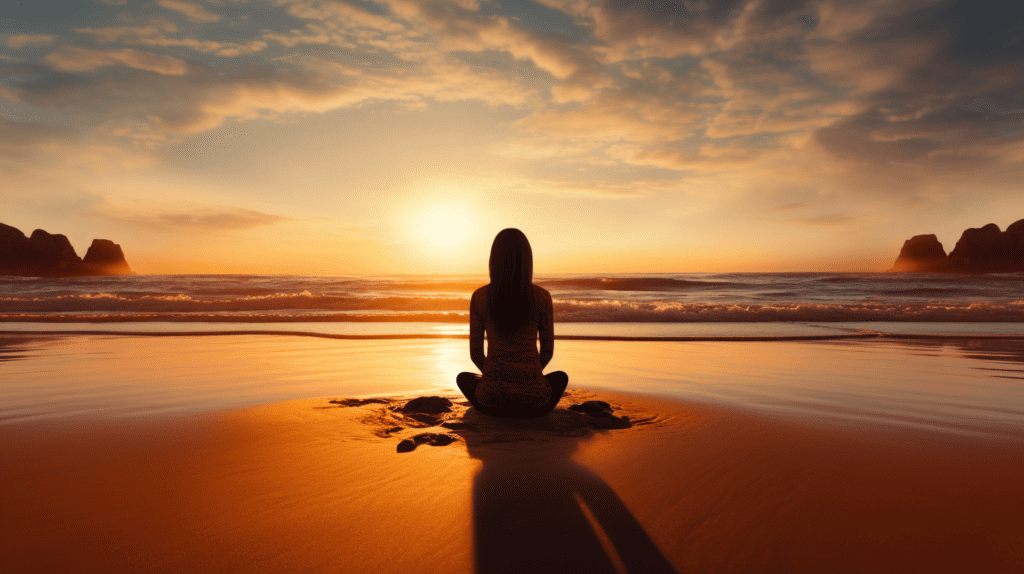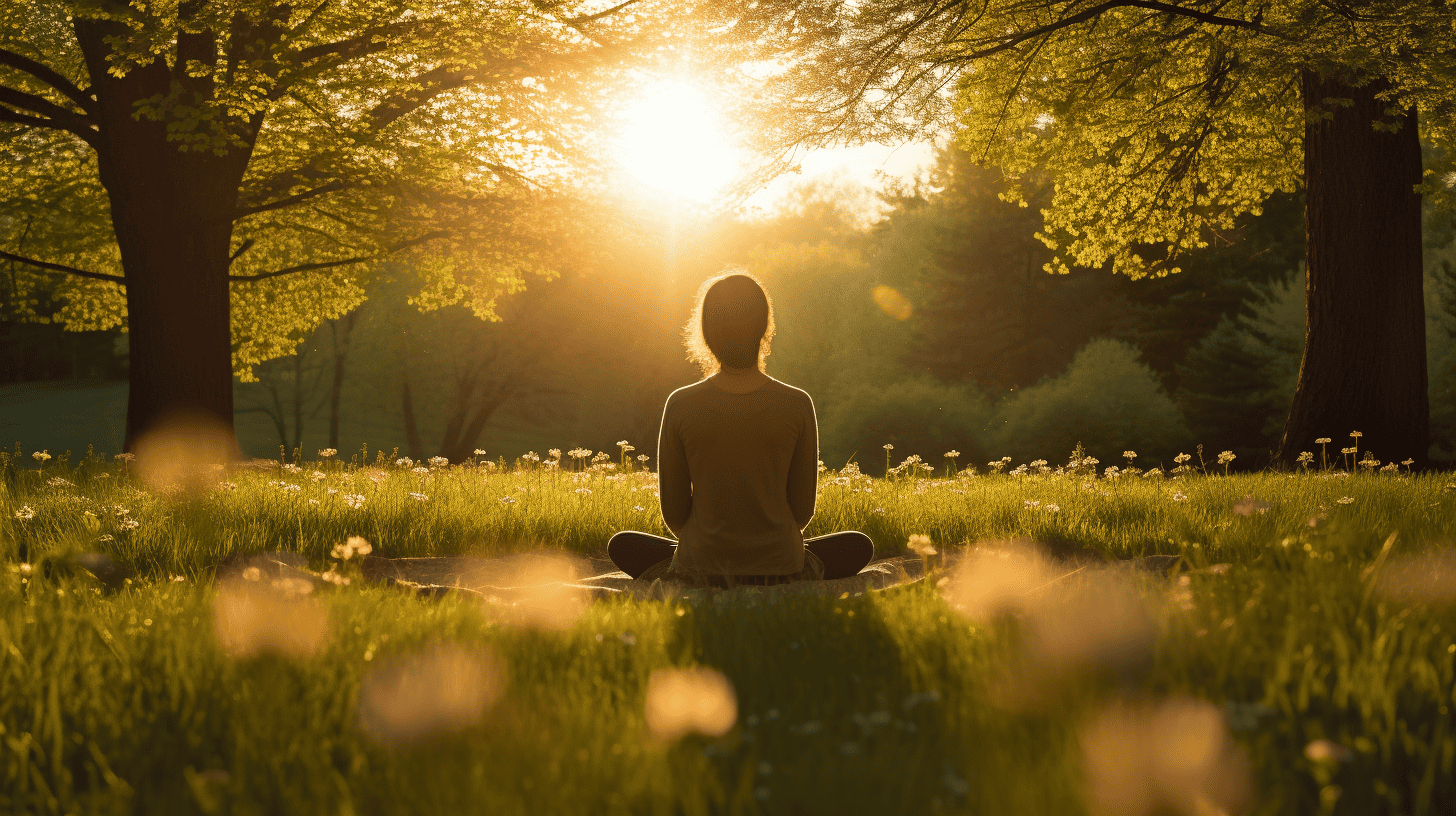Meditation has become an increasingly popular wellness practice in recent years. Research shows that regular meditation can reduce stress, improve focus, boost emotional health, and provide many other benefits. But when is the best time to meditate to reap these rewards?
In this comprehensive guide, we’ll explore the pros and cons of meditating at different times of the day. We’ll consider factors like energy levels, schedules, and lifestyles to help you determine the ideal time to incorporate meditation into your daily routine.
Whether you’re a beginner looking to start a meditation practice or an experienced practitioner hoping to deepen your practice, read on to find out when should meditation be done.
Key Takeaways:
- Morning meditation helps start the day calmly and focus before stress accumulates.
- Midday meditation offers renewal and perspective during hectic workdays.
- Evening meditation allows decompression and processing time after demanding days.
- Consistency matters most – pick a time you can stick to daily.
- Start small – even 5-10 minutes can be beneficial.
- Listen to your body’s natural rhythms and energy flow.
- Attach a guided meditation to existing habits like your morning coffee or commute home.
- Recalibrate your schedule weekly to make sure the timing still works.
- Don’t judge your sessions – show up. With experimentation, you’ll find your ideal routine.
The Benefits of Daily Meditation
Before determining the best time to meditate, let’s quickly review why meditation is such a valuable self-care ritual in the first place.
Here are some of the scientifically proven benefits of a regular meditation practice:
- Reduced stress and anxiety
- Increased focus and concentration
- Decreased depression
- Lower blood pressure
- Improved immunity
- Increased happiness and well-being
- Greater emotional regulation
- Improved sleep quality
Research has demonstrated that meditation causes lasting changes in the brain. Regular meditation can rewire your brain to promote calm, focus, and emotional positivity.
Finding a consistent time to meditate daily enables you to cultivate these benefits. You’re likelier to stick with meditation and experience results when it becomes a habit.
So, when should you schedule your daily meditation session? Let’s weigh the pros and cons of different times of day.
Morning Meditation
For many people, the morning offers an ideal time for meditation. Here are some of the potential benefits of an early morning meditation session:
You Can Meditate Before the Day Gets Hectic
Mornings tend to be quieter and slower-paced than other times of the day. You likely have fewer distractions and demands on your time and attention first thing in the morning. This allows you to meditate with focus before the day’s stresses accumulate.
The Art of Living: Morning meditations are considered especially beautiful if done before sunrise while the world is still quiet, creating an atmosphere of harmony.
It Helps You Start the Day Calm and Centered
A morning meditation session can put you in a peaceful, positive state of mind from the moment you wake up. This helps set the tone for your whole day. You’re primed to handle whatever comes your way more clearly and easily.
It May Boost Your Productivity
Some research indicates that morning meditation improves focus, self-control, and memory. This can boost your productivity and performance right from the start of your workday.
Morning Routines Help Cement Habits
When you tack meditation onto your early morning routine, right after brushing your teeth or drinking your coffee, it’s more apt to stick. You’re cementing it as a habit first thing.
Your Mind May Be Calmer
Our minds often seem more settled and clear upon waking. Before the clutter and noise of the day accumulate, it may feel easier to stabilize your attention during meditation.
Of course, mornings aren’t ideal for everyone. Here are a few potential downsides:
- You may struggle with early rising or grogginess.
- Your morning schedule may already feel crunched.
- Your mind might feel foggy if you’re not a morning person.
But for many, starting the day with meditation feels like a perfect ritual. Julia Cameron, the author of The Artist’s Way, endorses the practice of “morning pages,” which she says:
“provoke, clarify, comfort, cajole, prioritize and synchronize the day at hand.”
If you want to try morning meditation, aim to wake up 30-60 minutes earlier to allow time for it before breakfast or your commute. Even 10-15 minutes can make a difference.
It may take some adjustment, but you’re likely to find mornings are a calm oasis ideally suited to meditation.
Midday Meditation
Another prime opportunity for meditation is your lunch break or during another midday pause. Here’s why midday may work for you:
It Offers Renewal during Your Workday
The middle of the workday tends to be when your energy starts flagging and your focus wavers. A quick meditative break can provide mental renewal when you need it most.
It Lets You Reset after a Stressful Morning
If your morning has been hectic or anxiety-provoking, meditation gives you a chance to recentre and clear your head before the afternoon.
You Have Time Set Aside for a Break
It’s easy to justify meditating when you already have a chunk of time allotted for lunch or mid-afternoon respite.
There Are Spaces Designed for Peace and Quiet
You may have access to quiet rooms, gardens, or other spaces conducive to grabbing a few minutes of meditation at work or school.
You Can Practice Mindful Eating
Making lunch a meditative ritual allows you to cultivate mindful eating habits. You can pay close attention to the experience of nourishment.
Some potential downsides of midday meditation:
- It can feel difficult to find true privacy at work/school.
- You may have limited time if your lunch break is short.
- Food comas can make you too sleepy!
But in general, midday meditation is an effortless way to inject mindfulness into your day. Look for 10-15 minute windows when your energy starts to fade and productivity is down. A brief meditation can recharge you for an effective afternoon.
Evening Meditation
The transition from day to evening is another potential meditation time. Here are some upsides to evening meditation:
It Offers the Chance to Decompress After a Long Day
Some find their minds too busy in the morning or midday to settle down. But after work or evening activities wind down, meditation provides the perfect chance to decompress.
Livestrong (Dr. Skillicorn): Meditating at night can be a great way to clear the mind and body of the day’s stress for a better night’s sleep.
You Can Reflect Back on Your Day
You can gain a reassuring perspective by looking back on your day’s events and emotions with mindfulness. Meditation helps “process” experiences that may have been overwhelming in the moment.
It Can Settle Your Mind Before Bed
Meditation may counteract the effects of a stressful day and prepare you for more restful sleep. Clearing away mental clutter can prevent tossing and turning and insomnia.
You Generally Have More Free Time Available
While work and family obligations dominate mornings and afternoons, you may have more flexibility to pause and meditate as your evening frees up.
Potential challenges with evening meditation include:
- Fatigue starts setting in after a long day
- You may get lost in planning tomorrow vs. staying present
- Low motivation or discipline after a busy day
But if you feel most centered and clear-headed in the evening, taking 10 minutes to meditate can become the perfect nourishing end-of-day ritual. As meditation teacher Tara Brach suggests:
“Consider meditation as a way to close your day and cultivate a trusting, compassionate presence as you relax into sleep.”
Any Time of Day Can Work for Meditation
While the benefits of morning, midday, and evening meditation may stand out, the truth is you can meditate successfully at any time of day.
Don’t overthink finding the “perfect” time. Experiment with different windows that fit naturally into your schedule.
Here are some more tips for choosing a consistent meditation time:
- Pick a time you can stick to daily. Consistency matters more than the exact timing.
- Make sure you won’t be interrupted. Turn off devices and avoid busy settings.
- Meditate for any length of time. Even just 2-5 minutes can be beneficial.
- Match it to your energy levels. Play to your personal strengths as a morning/night person.
- Attach it to an existing habit. Like after your workout or commute.
- Set reminders to help build the habit. Using a phone alert, planner, or other cue.
Start Small and Be Flexible

When getting started, remember that shorter meditations of just 5-15 minutes can fit easily into even the busiest schedule. Look for small windows where you have time to focus purely on your breath, or insert mindful moments between tasks:
- Sitting down to work at your desk
- Waiting for your computer to start up
- Brushing your teeth
- Waiting for coffee to brew
- Riding the elevator
Being flexible will ensure you don’t get derailed by the ebb and flow of daily life.
When work deadlines or personal demands make your usual meditation time impossible, don’t beat yourself up. Just look for another opening.
Over time, as meditation becomes more habitual, you’ll naturally find yourself taking mindfulness breaks throughout the day anytime you need to reset.
Listen To Your Body’s Rhythms
While practical considerations like your schedule matter, it’s also important to tune into your body’s natural rhythms and energy flow.
Pay attention to when you feel most awake, clear-headed, and focused during the day. Then, match your meditation time to capitalize on that peak energy state.
You’ll get the most out of your practice when your body and mind feel vibrant and alert. Experiment with different times until you discover the proper alignment.
How to Design Your Ideal Meditation Routine
Once you’ve considered your own chronotype, schedule, and lifestyle factors, it’s time to design a meditation routine that works.
Ask yourself:
- When am I naturally most focused and calm?
- What time could I realistically carve out each day?
- Where can I meditate without distractions or interruptions?
Then, commit to sitting in stillness and observing your breath during this window for a set period, even if just 5 minutes.
Use cues like your morning coffee, office lunch break, or evening alarm to remind you. Over time, this meditation anchor will help form the habit.
Be flexible within your basic routine. On busier days, meditate for a shorter interval or in a different spot. Recalibrate weekly to make sure your timing still suits your needs.
By experimenting mindfully, you’ll find your own optimal meditation schedule. Be consistent, listen to your body and mind, and don’t judge yourself on “good” or “bad” sessions. Show up with presence and let the rest unfold.
Conclusion on The Best Time to Meditate
Creating a consistent daily meditation practice takes trial and error to find the best timing for your needs and habits. But the research-backed benefits make it a worthy endeavor. When meditation becomes a keystone habit, it unlocks greater productivity, mental clarity, stress resilience, and overall well-being.
Hopefully, this guide has given you some ideas and inspiration to start experimenting with the ideal time to incorporate meditation into each day, whether morning, midday, evening, or anytime in between. By paying attention to your energy and schedule, you can discover your perfect routine.
When you’ve found that meditation sweet spot, you’ll look forward to these minutes as a nourishing chance to reset and Recentre, no matter how busy life gets.
FAQ on When Should Meditation Be Done
Q: What is the best time to meditate?
A: The “best time” to meditate can vary from person to person. It’s important to find a time that suits your lifestyle and daily routine. Some people prefer to meditate in the morning before the day begins, while others may find that making time in the evening plays a key role in relaxation. The main goal is to make meditation a part of your day, regardless of the specific time.
Q: How can I find time to meditate in my busy schedule?
A: Finding time to meditate in a busy schedule can be a challenge, but it’s possible. Try to identify a part of the day where you generally have some downtime, even if it may vary. Some find the ideal time to meditate during lunch breaks, others before bed. Utilizing a meditation app can be beneficial in making meditation a habit by sending reminders and tracking your progress.
Q: Is meditating first thing in the morning beneficial?
A: Yes, meditating first thing in the morning can be beneficial. It helps set the tone for the day, manage your thoughts and emotions, and cultivate mindfulness. Starting the day with mindfulness meditation can also help you deal with what’s going on in your day better. But remember, the best time will depend on your personal preferences and lifestyle.
Q: How can I be sure I am ready for meditation?
A: You can be sure you’re ready to meditate when you’re open to exploring your thoughts and emotions in a non-judgmental manner. Having a quiet place to sit (a meditation cushion can be helpful) and a set time in your day can also add to the readiness. And remember, there’s no perfect way to meditate—sometimes you might not feel as focused, and that’s okay.
Q: Can I meditate any time other than morning or evening?
A: Absolutely. While many suggest the a.m or p.m as common times to meditate, it ultimately depends on your lifestyle and when you feel you need it the most. Some people even find that taking a break mid-day for some mindfulness is particularly beneficial.
Q: What’s the best time of day to meditate if I have a 9 to 5 job?
A: If you have a 9 to 5 job, the best times might be in the morning before work or in the evening after work. However, if your job allows for breaks, a quick mindfulness meditation session during lunch can also help to clear your mind and refocus for the rest of the day.
Q: How do I make sure I’m consistent with my meditation schedule?
A: Consistency is key in meditation. This can be cultivated by finding a particular time that works best for you and sticking to it. Use a meditation app for reminders and to track your progress. Over time, meditation will become a regular part of your day, much like brushing your teeth or any other ritual.
Q: Will meditating at the same time every day increase the benefits of meditation?
A: Consistency does play a role in obtaining the full benefits of meditation. However, these benefits arise from the act of regular meditation itself rather than the specific time you meditate. So, while meditating at the same time every day might help you form a regular habit, the main point is to incorporate regular meditation in your routine at whichever time works best for you.
Q: What can I do if I find no suitable time to meditate during my day?
A: If you find it difficult to allocate a specific time to meditate, remember that even short periods of meditation can be beneficial. For example, taking a few moments to focus on your breath or practicing mindful observation while waiting for your coffee to brew. Ensure you make room for some form of mindfulness regardless of how life throws your to-do list.
Q: Should I consult with a meditation expert to find the best time for me to meditate?
A: While expert advice can be helpful, the best time to meditate truly comes down to your personal routine and lifestyle. Experiment with meditating at different times of the day to see what works best for you. A meditation expert can certainly provide guidance and tips, but the optimal time to meditate differs for everyone.





Leave a Reply